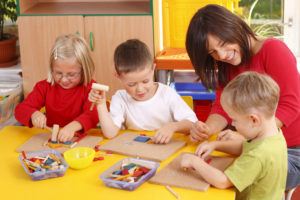 When parents seek out daycare alternatives, the benefits of academic preschool tend to win over families who want their children to develop both intellectually and socially. In fact, the number of three- to five-year-olds enrolled in preprimary programs like nursery school and preschool increased from 59% to 65% from 1990 to 2013. That means that the majority of parents understand that preschool education activities are highly advantageous for their children in terms of how they grow and learn.
When parents seek out daycare alternatives, the benefits of academic preschool tend to win over families who want their children to develop both intellectually and socially. In fact, the number of three- to five-year-olds enrolled in preprimary programs like nursery school and preschool increased from 59% to 65% from 1990 to 2013. That means that the majority of parents understand that preschool education activities are highly advantageous for their children in terms of how they grow and learn.
Before sending their kids off to preschool, parents need to evaluate whether it’s the right time. Each child develops at a slightly different rate, and preschool education activities can help children at all skill levels. However, there are a few points you should always consider to determine whether your child is ready to go to preschool yet.
- Potty Training
Many preschools and daycare centers require children to be potty trained. That doesn’t mean your son or daughter will be expelled over an accident, but his or her progress in potty training should be a factor in your decision making. If your preschool of choice does have such a requirement, you’ll need to ensure your child meets this obligation. Some preschool centers don’t require kids to be potty trained, but it’s still a good idea to at least get started before enrollment begins. - Sharing and Social Interaction
While it’s not a requirement for kids to master all social niceties, they should at least have experience interacting with other children. If your child has had limited playtime with other kids, consider getting him or her involved in a play group before starting preschool. Your child should be able to share, take turns, and cooperate with other students. - Following Instructions
In preschool, children will be in a structured environment, and they will be expected to follow simple rules and instructions. Preschool students will learn how to go from one activity to the next throughout the day, as well as clean up and follow other directions. While not a requirement, if your child is not able to consistently handle such transitions, you may want to work on this prior to enrolling. - Separation
When you send your child to preschool, he or she will have to be separated from their parents for at least a few hours during the day. Children who have gone to daycare or who have spent time with babysitters or nannies usually don’t have a problem entering preschool. On the other hand, children who have rarely spent time away from their parents or outside their home may have trouble adjusting. The first week of preschool may still be difficult for both student and parent; however, in most cases, children are able to quickly adjust and overcome their anxieties about separation after experiencing a few days of routine and fun with their new classmates.
Preschool education activities and lessons are the best way to ensure grade school readiness for your child. For more information or to discuss whether your child is ready for preschool, please contact Learn & Grow Academy today.


